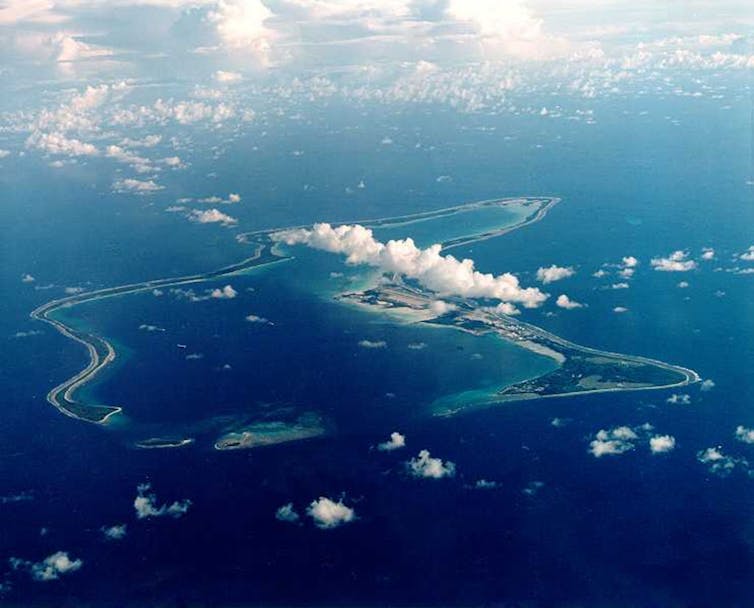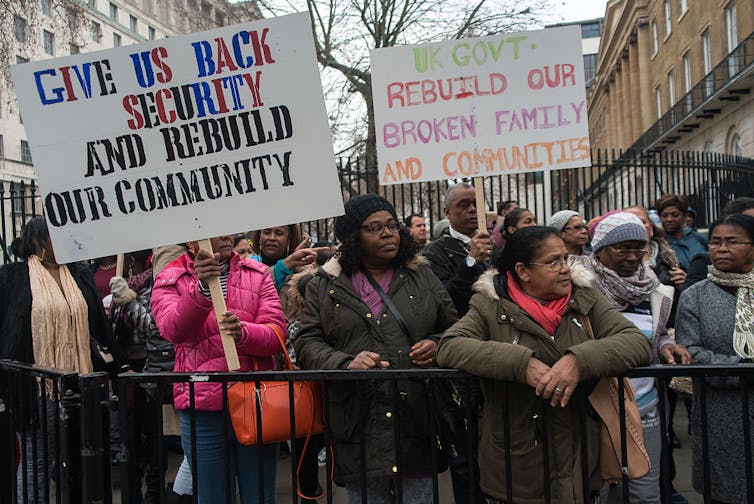Editor’s note: Peter Harris, associate professor of Political Science at Colorado State University, wrote this piece for The Conversation in February 2022. Colorado State is a contributing institution to The Conversation, an independent collaboration between editors and academics that provides informed news analysis and commentary to the general public. See the entire list of contributing faculty and their articles here.

History/Universal Images Group via Getty Images
The decolonisation of Mauritius was never fully completed. This is because, in 1965, the British government put islands belonging to Mauritius into a new colonial jurisdiction, the British Indian Ocean Territory, which still exists today. It is long past time for this colonial-era wrongdoing to be made right, and for Mauritius to be made whole.
The islands in question are the Chagos group in the central Indian Ocean. In the early 1960s, British and American diplomats conspired to establish a military base on Diego Garcia, the largest atoll of the Chagos Archipelago.
The island was attractive for a number of reasons: it boasted a natural harbour, was big enough to host a sizeable military presence (including a large airstrip), and was situated roughly equidistant between East Africa and Southeast Asia.
In short, Diego Garcia was the perfect place from which to guard against the expansion of Soviet naval power and political influence in the emerging Third World. But as the Mauritius-born scholar Jean Houbert later wrote:
There were two problems, however: the Chagos belonged to Mauritius, and they were inhabited.
Conceived in illegality
Determined not to let these obstacles prevent the construction of a military base on Diego Garcia, officials in London resorted to sheer illegality.
First, Britain dismembered the colony of Mauritius by making the Chagos Islands part of the new colony of British Indian Ocean Territory in November 1965, an entity that would remain firmly under the control of London.
Next, British agents forcibly depopulated the entire Chagos group between 1965 and 1973. The point was to establish that the archipelago lacked a permanent civilian population, and so could be governed as nothing other than a militarised site.
Port Louis and other African capitals have long alleged that the detachment of Chagos from Mauritius was a violation of prevailing rules on decolonisation. In 2019, the International Court of Justice agreed with this view in a scathing advisory opinion. So have other international courts, as well as the UN General Assembly.

Photo by Alberto Pezzali/Pacific Press/LightRocket via Getty Images
The depopulation of Chagos has been ruled unlawful, too. In 2000, two High Court judges in the UK held that a legal ordinance enacted in 1971 to expel the indigenous Chagos Islanders was entirely incompatible with British law, and that preparations ought to be made for the islanders to exercise their lawful right of return.
This means that Britain enjoys the dubious distinction of having broken both international and domestic laws within just a few years of creating the British Indian Ocean Territory –- hardly an auspicious beginning for the country’s last ever colony.
Rules-based order
Today, British leaders claim to be committed to a “rules-based” order in the Indo-Pacific. At least one Member of Parliament has portrayed the military base on Diego Garcia as central to this endeavour. If this is true, however, then it must come as quite a surprise to the government of Mauritius and members of the exiled Chagossian community.
Britain never did allow the Chagos Islanders to return to their homes, despite having been instructed to do so by its own judiciary. Instead, the government used Orders in Council –- a form of primary legislation done without any input from Parliament –- to reimpose the total exile of the Chagos Islanders in 2004.
This grossly undemocratic measure was, in effect, a way to sidestep the High Court and rid the government of an inconvenient constraint on its power. The islanders resolved to fight on, but their legal challenges have so far come to nothing.
Nor has London bowed to international pressure to decolonise. Only five states agree with Britain that the Chagos Islands ought to remain under its jurisdiction. By contrast, more than 23 times as many – a whopping 116 world governments – have called for Britain to exit the Chagos Islands “as soon as possible.”
Can a state be regarded as friendly to the idea of rules-based global governance when it shows such blatant disregard for international law, institutions, and world opinion?
Mauritius and the Chagossians
For a long time, Port Louis and the Chagos Islanders’ various campaign groups waged their legal and political battles in isolation from one another. Today, however, they have come together in support of decolonisation.
When the flag of Mauritius was raised last week above the Chagos islands of Peros Banhos and Salomon, the Mauritian ambassador to the United Nations stood proudly alongside Olivier Bancoult of the Chagos Refugees Group.
It is important to emphasise that not all Chagossians agree with this joining of forces. Some view Port Louis with distrust and point out that their people have suffered mistreatment at the hands of both governments, not just Britain.
However, if justice is ever going to be done in the Chagos Islands –- including a restoration of the islanders’ right of return -– then it will only happen under Mauritian sovereign control. This much is abundantly clear by now: decolonisation is a prerequisite for resettlement.
Decolonise now
Mauritius has waited long enough to regain its lost territory. Especially given that Port Louis has pledged to allow the US base on Diego Garcia to exist under its stewardship, there are no excuses left to justify persistent British colonialism.
All that remains is for Britain to do the decent thing and decolonise the Chagos Archipelago without delay. In the final analysis, this is the best way for London to demonstrate its commitment to international rules: to actually follow them.![]()
This article is republished from The Conversation under a Creative Commons license. Read the original article.